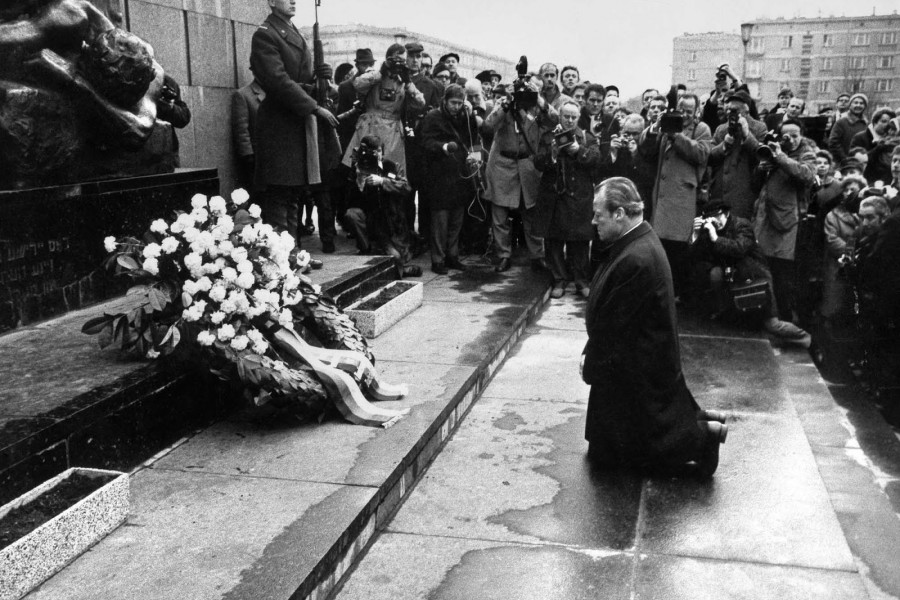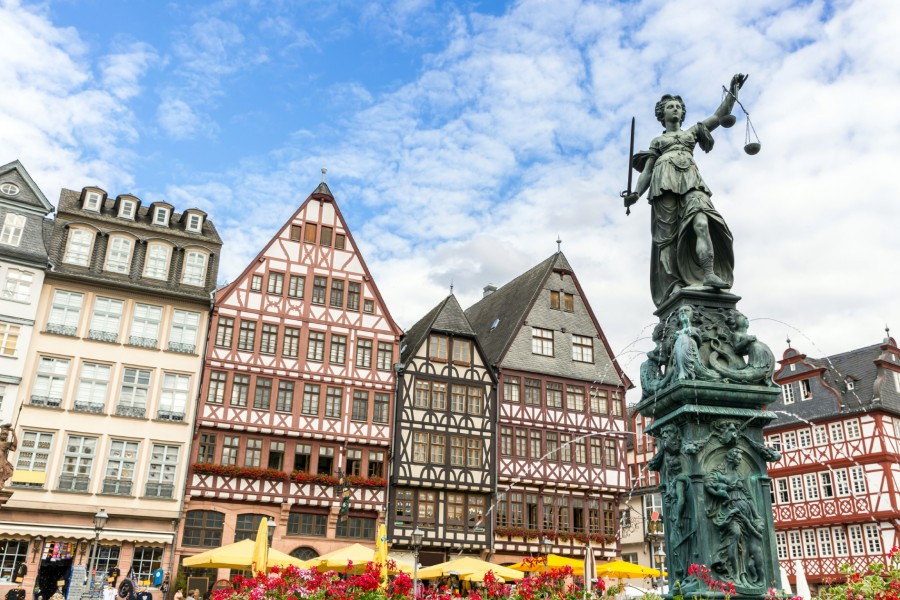About the Major
Overview

Warschauer Kniefall, 1970.
The Undergraduate Program in German offers undergraduate students the opportunity to pursue in-depth study of German language, literature, philosophy, art, and media. Taking classes taught in English as well as German from the broad range of faculty in the department, students gain exposure to historical subjects ranging from the Middle Ages to the present day, along with a rich palate of critical approaches.
The undergraduate program offers six different tracks:
- German Literature
- German Philosophy and Intellectual History
- Media and Aesthetics
- Linguistics
- Study of Two Literatures
- Joint Program in Culture and Politics
In Fall of junior year, concentrators participate in the Junior Seminar, which introduces students to diverse methods of research and styles of criticism. The seminar prepares students for the exciting independent work they undertake in their Spring Junior Paper and, during the following year, in the Senior Thesis.
For further information, see the Department’s Guide to Independent Work.
Engaged student-faculty relationships are the core of the undergraduate program. The combination of rigorous classwork and independent research helps students hone their analytic skills and deepen their historical knowledge. At the same time that they acquire valuable tools for critical thinking and argumentation, students cultivate individual areas of interest that will be valuable long after graduation.
Language Prerequisite

Römerberg Old Town Square - Frankfurt
The requirement for admission to the department is a satisfactory working knowledge of German demonstrated by the completion of GERMAN 107, an SAT II subject test score of 740, or a grade of 4 or 5 on the advanced placement test.
For more information about placement options, self-study and language learning, and ways to improve your German, see German Language and Learning.
Areas of Concentration

Duchess Anna Amalia Library in Weimar and Juden Europa, plaque, Berlin. Image(s) credit: Thomas Y. Levin
The department offers six areas of concentration. For areas 1 to 5, at least three, and for area 6, at least two of the departmentals should be courses taught in German. Detailed information about all aspects of the Undergraduate Program in the German Department is available in the Undergraduate Handbook.
1. German Literature
Focuses on the major periods and forms of German literature with emphasis on literary and historical analysis. Students take a minimum of five courses in the department (usually no more than two at the 200 level) and a maximum of three cognate courses in related humanities departments and other disciplines such as Philosophy and Religion.
2. German Philosophy and Intellectual History Track
Concentrates on philosophy, political and cultural theory, particular intellectual movements and epochs in German-speaking contexts. Students take a minimum of five courses in the German Department (usually no more than two at the 200 level), and a maximum of three relevant cognate courses in History, European Cultural Studies, Religion, or Philosophy.
3. Media & Aesthetics Track
Designed for students who wish to focus on art, film, music, sound technology, and/or media theory broadly conceived. Students take a minimum of five courses in the German Department (usually no more than two at the 200 level), and a maximum of three relevant cognate courses in Art & Archaeology, Music, Philosophy, European Cultural Studies, and the Program in Visual Arts.
4. Germanic Linguistics Track
Concentrates on the history and structure of the German language. Majors who select this track are required to take Linguistics 213 (Introduction to Language and Linguistics) or a comparable course in linguistics, and two seminars related to topics in Germanic linguistics: GER 505 (History of the German Language) or GER 508, and GER 506 (Second Language Acquisition and Pedagogy) of GER 316. In addition, such students will take at least three other courses in German literature and culture (usually no more than two at the 200 level), as well as two cognate courses.
5. The Study of Two Literatures
Consists of five courses in the German Department (usually no more than two at the 200 level) and three upper-level courses in a second literature. Students who have not completed the language preparation for the second literature may select this track provided that they satisfy this language requirement during the junior year.
6. Joint Program in German Culture and Politics
Students may combine a concentration in German literature and culture with a concentration in German/European politics and political theory. Four courses will be taken in the German Department (usually no more than two at the 200 level), on topics pertaining to German literature and culture, and four courses will be taken in the Department of Politics (usually no more than two at the 200 level), on topics pertaining to German/European politics or political theory. The senior thesis may focus on any political topic with a substantive German-related component. Upon graduation, a letter will be issued by the department certifying the completion of a program in German cultural studies with a concentration in politics.




